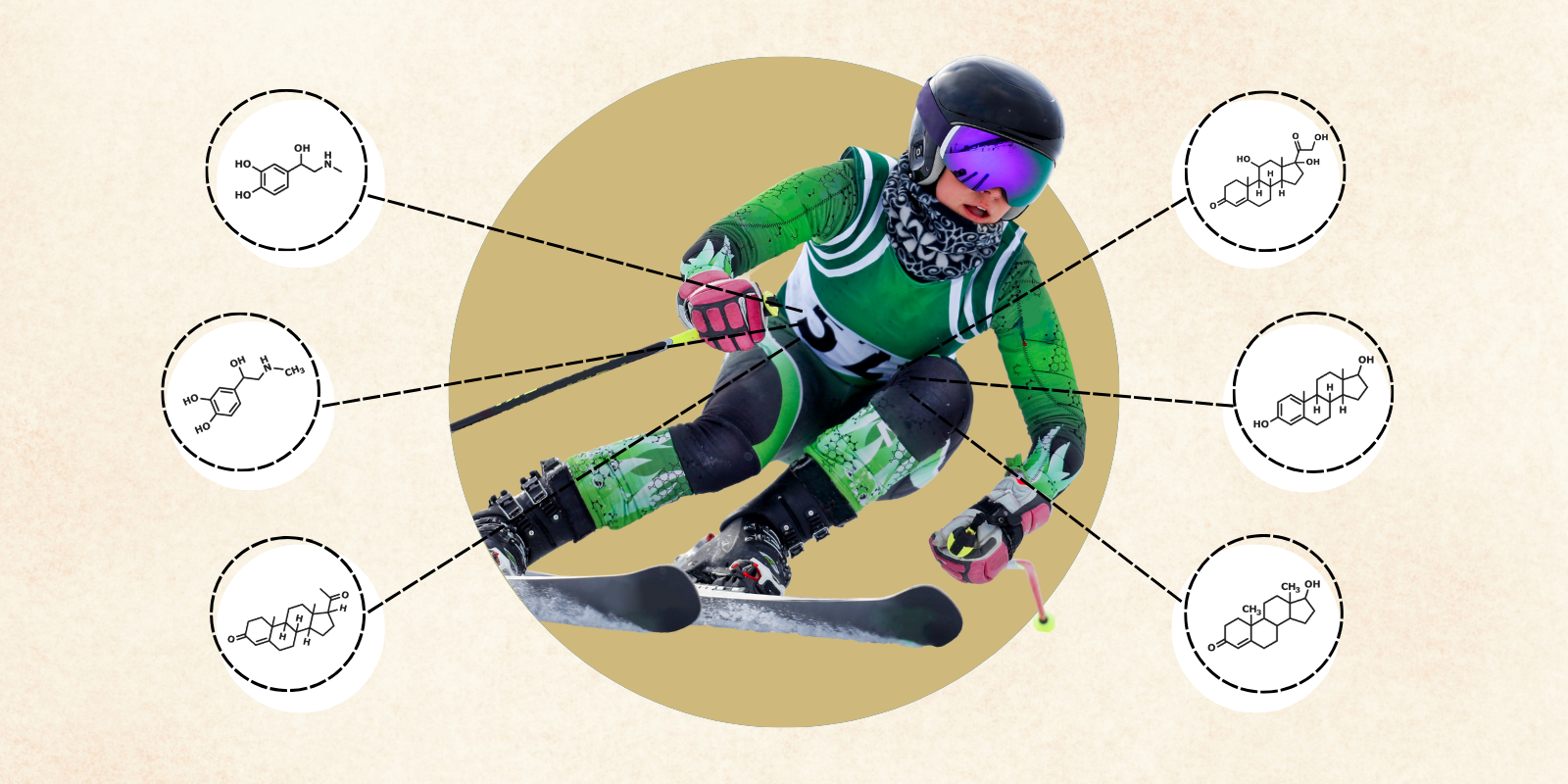Surrounded by a sea of research posters in a conference center at the University of Colorado Anschutz Medical Campus, Jordan Nelson, a third-year medical student at the CU School of Medicine, eagerly awaited the opportunity to discuss her research with others.
She was one of more than 60 presenters, ranging from seasoned faculty to trainees, who shared their research during the CU Department of Medicine’s Research Day on April 23, an annual event that showcases the department’s multifaceted and impactful research.
“The folks around this room and beyond do groundbreaking work every day,” said Department of Medicine Chair Vineet Chopra, MD, MSc, to a crowd of more than 150 attendees. “We do everything from fundamental bench-based science all the way to applying our discoveries into the clinical workspace.
“And because we are a clinical department, and because we are indeed focused on delivering care at the bedside, we have this incredible ability to connect the dots — to begin from the lab and take it to the actual patient at hand.”
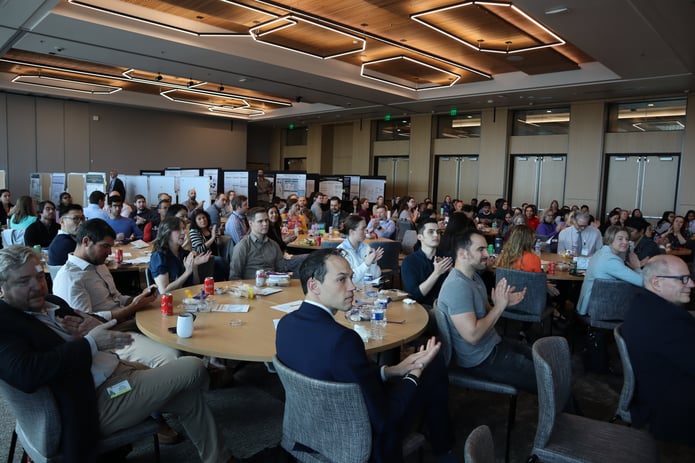 More than 150 people attended the CU Department of Medicine's Research Day on April 23, 2024.
More than 150 people attended the CU Department of Medicine's Research Day on April 23, 2024.
To offer attendees a snapshot of the impressive breadth of work being done in the Department of Medicine, Research Day offered a variety of presentations, including research highlights from five faculty members, poster sessions, a series of “lightning talks” from faculty and students, and a keynote presentation by Stan Lapidus, an inventor and entrepreneur.
Topics included improving cancer detection, treating chronic pain, exploring the connection between sleep and bone health, expanding knowledge about rheumatoid arthritis, and examining the impact long-term care can have on older adults’ social lives — to name a few.
“We are the engine on campus in terms of research,” Chopra said.
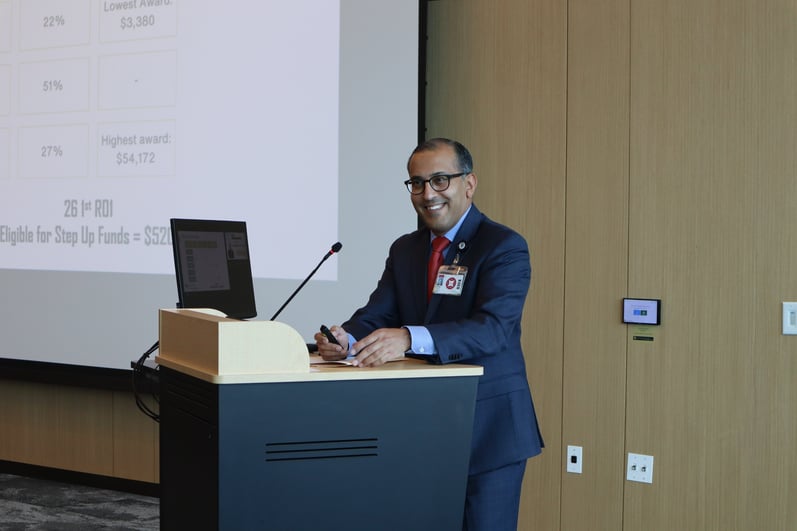 University of Colorado Department of Medicine Chair Vineet Chopra, MD, MSc, speaking to a crowd on April 23, 2024, as part of the department's annual Research Day.
University of Colorado Department of Medicine Chair Vineet Chopra, MD, MSc, speaking to a crowd on April 23, 2024, as part of the department's annual Research Day.
‘It’s awesome to have a platform here’
As a medical student early in her research career, Nelson was thrilled at the opportunity to discuss her research and learn from some of the best minds in the field.
“It’s awesome to have a platform here at CU and not have to travel to a different state to present the same work,” she said. “I think it's really important to draw connections on campus and be able to see what other people on campus are working on.”
Nelson’s research poster focused on how people may be able to use large language models, such as ChatGPT, to explore the therapeutic process in the psychological treatment of chronic pain.
Nelson and her research team partnered with the company Lin Health, which offers health solutions for chronic pain. Using an Open AI large language model, her team analyzed 1,200 patient-coach sessions from 104 patients undergoing treatment for chronic pain.
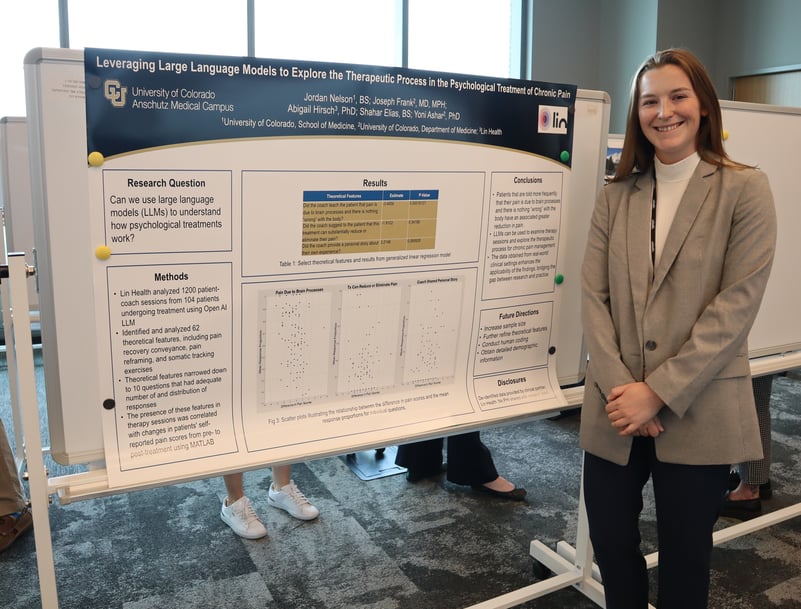 Jordan Nelson, a third-year medical student at the CU School of Medicine, presented her research on April 23, 2024, as part of the CU Department of Medicine's Research Day.
Jordan Nelson, a third-year medical student at the CU School of Medicine, presented her research on April 23, 2024, as part of the CU Department of Medicine's Research Day.
What they found was that these large language models can be used to examine therapy sessions and explore the processes therapists use to address pain. For instance, their investigation’s findings suggested that patients who are told more frequently that their pain is due to brain processes and there is nothing “wrong” with their body have an associated greater reduction in pain.
Beyond sharing this information with others, Nelson’s favorite part of Research Day was the opportunity to build her network and form relationships that will hopefully lead to future projects.
“It’s definitely intimidating when you’re surrounded by research giants, but it’s also so wonderful to collaborate and make connections, and get feedback on the work that we’re doing,” she said. “That’s really inspiring and gets me excited to do more.”
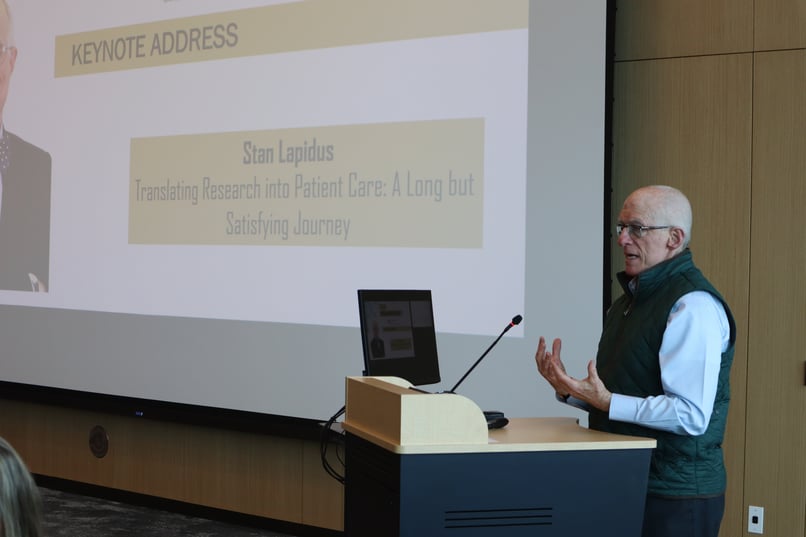 Stan Lapidus, an inventor and entrepreneur, was the keynote speaker for the CU Department of Medicine's Research Day on April 23, 2024.
Stan Lapidus, an inventor and entrepreneur, was the keynote speaker for the CU Department of Medicine's Research Day on April 23, 2024.
Tips for success
One of the research giants who faculty and students like Nelson could learn from on Research Day was Stan Lapidus, the keynote speaker.
Lapidus, an inventor and entrepreneur who holds 37 patents in methods for early detection of cancer, was the founding CEO of multiple medical diagnostics companies.
In 1987, for instance, he founded Cytyc Corp., which revolutionized early detection of cervical cancer by developing ThinPrep, the modern Pap test. Less than a decade later, in 1995, he founded EXACT Sciences, pioneering non-invasive early detection of colorectal cancer through the Cologuard test.
A recurring lesson throughout his career was that translating research into patient care often takes longer and costs more than a person expects.
To succeed, Lapidus said it is important to have a high-quality problem, explaining that the quality of the problem determines the outcome.
When it comes to venture capital fundraising, a person needs to have an engaging story, realistic plans, and the ability to adapt those plans when circumstances change, he said.
“Having the courage to constantly revise and make changes in the company as one goes along is really the hard part,” he said.
It is also important to read as much relevant material as possible, such as approval documents from the U.S. Food and Drug Administration, public company filings, industry newsletters, and other examples of patents, he said.
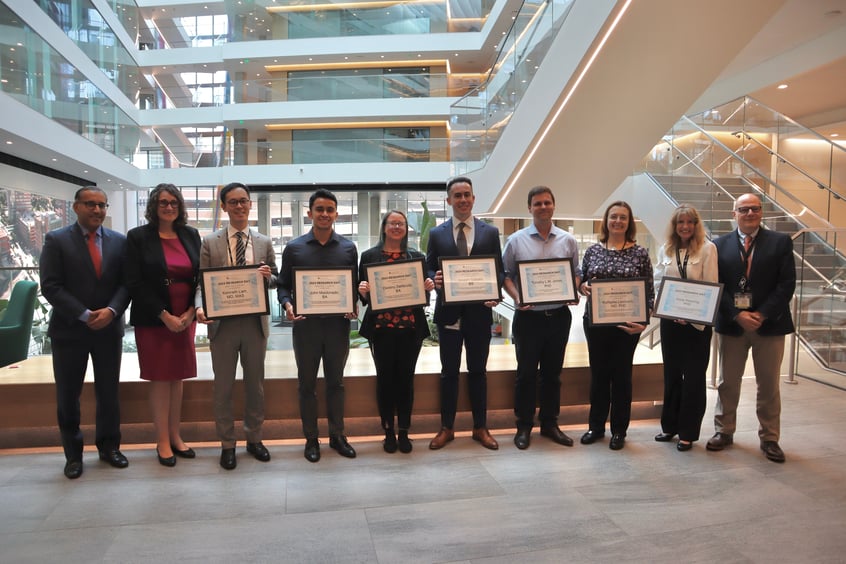 Presenters who gave "lightning talks" at the CU Department of Medicine's Research Day on April 23, 2024, hold up their certificates alongside department leaders.
Presenters who gave "lightning talks" at the CU Department of Medicine's Research Day on April 23, 2024, hold up their certificates alongside department leaders.
People should also try to “meet everyone,” he said, including competitors, regulators, editorial board members of leading journals, medical society leaders, and prominent physicians, scientists, and engineers.
“The reason all of this learning is important is because it makes for an engaging story, it helps establish a baseline to explain why you’re different and it helps you understand what happens when adversity hits,” he said.
Building a network of support was a common theme for many of the presenters at Research Day, underscoring the value of the event.
Chopra said one of the reasons the Department of Medicine continues to host Research Day is to enhance the department’s community connection by sharing one another’s passions and collaborating on new ideas.
“Research is a team sport,” Chopra said. “We do it all, together.”


